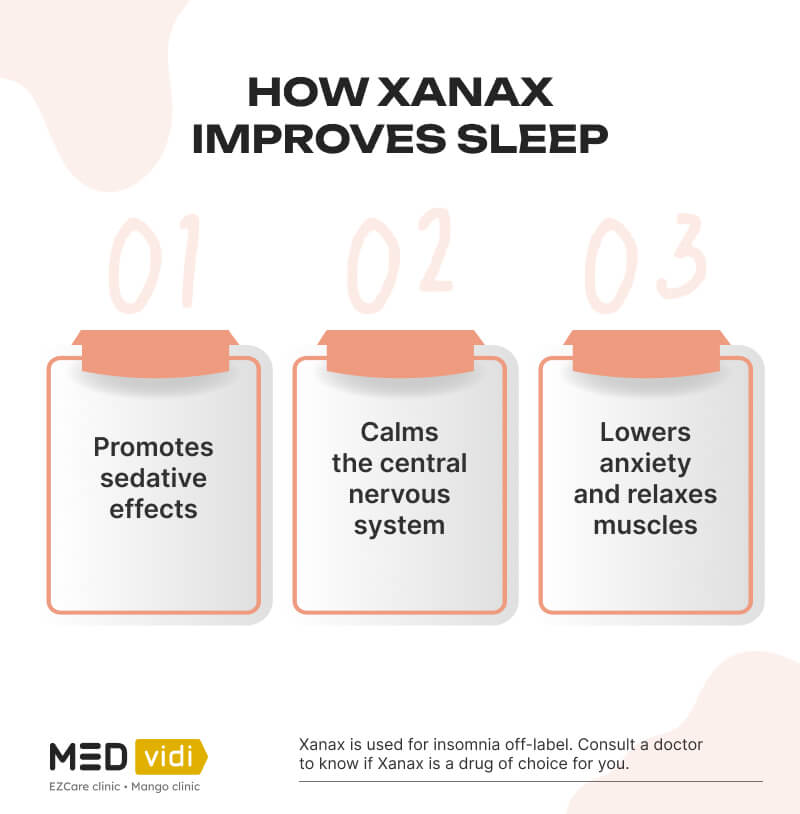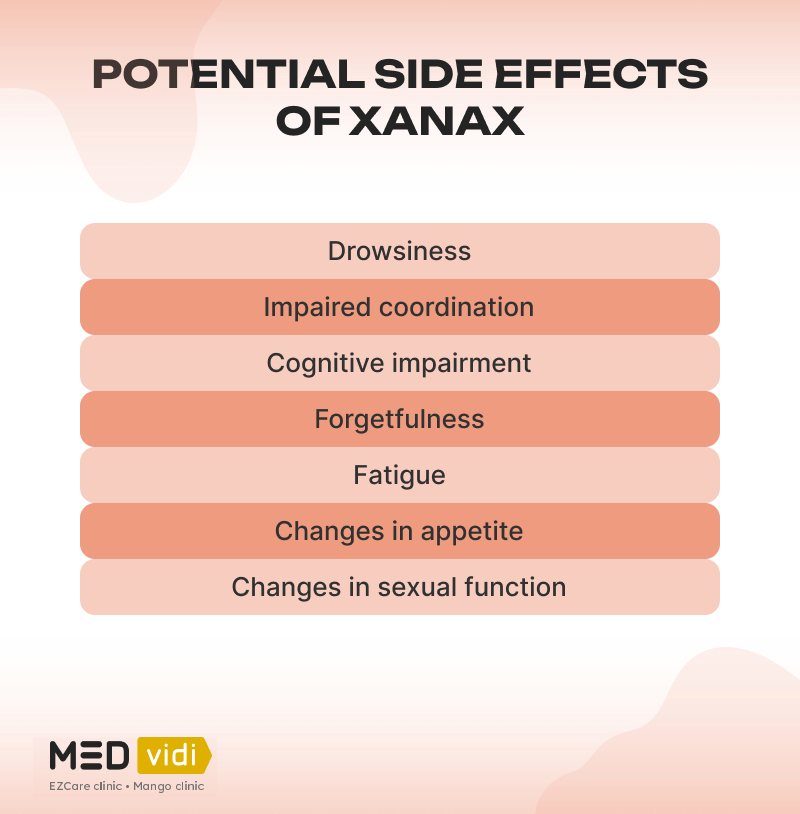Mounting pressures and stressors can make a good night’s sleep an elusive pursuit. Insomnia and sleep disturbances have become more prevalent, increasing the demand for sleep aids and medications to treat sleep disorders. One drug that has drawn interest is Xanax (alprazolam), a well-known benzodiazepine recognized for its sedative effects. Although Xanax is typically recommended for anxiety and panic disorders, there is controversy in the medical field over its off-label use to treat insomnia.
This article will examine the advantages, drawbacks, and issues of using alprazolam for sleep. Read on to find out more about the available research on Xanax’s ability to help people fall asleep and stay asleep and any potential risks associated with its use.
Start your journey towards restful nights today. Consult a doctor online.
Does Xanax Help You Sleep?
Being a sedative drug, Xanax (alprazolam) reduces brain activity, encourages relaxation, and therefore can aid sleep. However, Xanax should only be used under a doctor’s supervision because it can potentially cause negative effects and could become habit-forming. If used correctly, it can be an effective solution.
How Xanax Makes You Fall Asleep?
Because of its
Can Xanax Make Sleep Worse?
While Xanax (alprazolam) is frequently prescribed to aid in sleep, it occasionally has the reverse effect. If Xanax keeps you awake, it can be because of the following reasons:
- Paradoxical reactions. Some people who use Xanax may have
paradoxical effects[2] . They may feel abnormal excitement and agitation, restlessness, or hyperactivity instead of being tranquil and drowsy. - Daytime drowsiness. The sedative effects of Xanax can last into the next day, resulting in excessive sleepiness and compromising daytime activities, which can interfere with sleep cycles.
- Rebound insomnia. When Xanax is used for a long time and then stopped, it might cause
rebound insomnia[3] , in which sleep problems temporarily get worse as the body gets adjusted to the absence of the drug. - Tolerance and dependence. Xanax has the potential to be habit-forming, and continued usage might lead to tolerance. To get the same sleep-inducing effect over time, greater doses would be needed, which can further disturb sleep patterns.
Those who get Xanax prescribed for improving insomnia symptoms but experience a reverse effect have a lot of alternatives. These include other prescription medications or over-the-counter options, such as melatonin supplements. However, switching to any other drug requires a consultation with a healthcare provider.
Personalized solutions for lasting results. Receive help for insomnia online.
The Side Effects of Taking Xanax for Sleep
Like any medication, Xanax can cause negative effects even when used as directed. The following are common side effects (including both mental and physical symptoms) people may experience while taking alprazolam for insomnia:
- Drowsiness. Excessive drowsiness from Xanax may result in fatigue and attention problems.
- Impaired coordination. Xanax can affect motor skills and coordination, leading to unsteadiness or clumsiness.
- Cognitive impairment. Confusion, memory issues, and trouble thinking or making decisions.
- Reduced alertness. Decreased reaction times can be hazardous, particularly while handling heavy machinery or driving a car.
- Slurred speech. Xanax may cause slurred speech or difficulty articulating words clearly.
- Fatigue and headache. Some individuals may experience fatigue and headaches as a side effect.
- Dizziness. Xanax can cause feelings of lightheadedness or dizziness.
- Nausea. It may induce feelings of nausea or upset stomach.
- Dry mouth. Xanax can lead to a dry mouth or a feeling of thirst.
- Changes in appetite. Some individuals may experience changes in appetite, such as increased or decreased hunger ultimately leading to weight changes.
- Mood changes. Xanax may cause changes in mood, including irritability, aggression, or depression.
- Sleep disturbances. Although sometimes prescribed for insomnia, Xanax can disrupt normal sleep patterns in some people, leading to difficulty falling asleep.

Potential Dangers of Using Xanax as a Short-term Sleep Aid
The U.S. Food and Drug Administration (FDA) has not approved Xanax specifically for insomnia treatment. So, using Xanax as a sleep aid even for a short term carries potential hazards. The following are some risks related to taking Xanax to treat sleep problems:
- Sedation and excessive drowsiness. Being a strong sedative, Xanax can cause excessive drowsiness, making it challenging to wake up and carry out daily activities. Your capacity to drive or handle machines safely could be impaired.
- Disrupted sleep architecture. While Xanax may aid sleep onset, it can potentially interfere with
sleep architecture[4] . Rapid eye movement (REM) sleep, which is necessary for restorative sleep, dreaming, and cognitive function, can be suppressed. Disturbed sleep patterns can lead to ineffective cognitive function and daytime tiredness. - Memory and cognitive impairments. Even after a brief period of use, Xanax may impair cognitive function and create memory issues in some individuals. This may impact your capacity to focus, learn, and retain information.
- Drug interactions. Xanax can interact with other medications, especially those that also depress the central nervous system, such as opioids, alcohol, or certain antidepressants. Combining Xanax with these substances can result in severe respiratory depression, unconsciousness, and overdose, which can be life-threatening.
- Risk of addiction. Using Xanax for sleep can increase the risk of developing a substance use disorder or addiction. Benzodiazepines like Xanax are associated with a high potential for misuse, and using them for purposes other than their prescribed use significantly increases this risk.
Potential Dangers of Long-Term Use of Xanax for Sleep
Xanax is not intended for prolonged use as a sleep aid. Here are some dangers associated with using it for sleep:
- Tolerance and dependence. With time, your body may become tolerant to Xanax effects, resulting in reduced effectiveness and requiring greater doses for the same sedative effects. Physical and psychological dependence on the drug may develop with prolonged usage, making it challenging to stop taking it without experiencing withdrawal symptoms.
- Withdrawal symptoms. When Xanax is abruptly stopped or dosed down after prolonged use, withdrawal symptoms may develop. They can include anxiety, sleeplessness, irritability, restlessness, muscle tightness, and perspiration. In severe circumstances, these symptoms may include seizures. To reduce withdrawal symptoms, it’s imperative to stop using Xanax under medical supervision gradually.
- Addiction and substance use disorder. A substance use disorder or addiction is substantially more likely to develop with prolonged Xanax use. It might be difficult to stop using benzodiazepines like Xanax after a prolonged period because they can cause psychological and physical dependence. Benzodiazepines like Xanax also have a significant potential for abuse.
- Increased risk of falls and accidents. Particularly in older people, Xanax might reduce coordination, balance, and reaction times, raising the risk of falls and accidents. When taken with alcohol or other drugs that depress the central nervous system, this danger is increased much more.
- Memory and cognitive problems. Long-term use of Xanax can result in memory problems and cognitive impairments. Individuals may experience difficulty with learning, concentration, and problem-solving, affecting their overall cognitive function.
How to Recover From Xanax Addiction
Getting over a Xanax addiction can be difficult, but it is achievable with willpower, encouragement, and the right care. The following broad actions can aid the recovery process:
- Acknowledge the addiction. Acknowledging the issue is the first step toward healing.
- Seek professional help. Speak with a medical expert, such as a doctor or an addiction specialist. They can assess your health and develop a care plan that suits your requirements.
- Gradual tapering. Avoid stopping Xanax suddenly because doing so can cause uncomfortable withdrawal symptoms. To reduce withdrawal symptoms, a healthcare practitioner can assist in creating a tapering regimen that progressively lowers the dosage.
- Detoxification. In some circumstances, especially if you have been using heavy doses or have an extended history of Xanax usage, a medically supervised detoxification program may be required. Using this method, you can control withdrawal symptoms while helping your body get rid of the medication.
- Therapy and counseling. To address the underlying issues causing your addiction, attend counseling or therapy sessions. CBT (cognitive behavioral therapy) and other types of therapy can assist you in creating coping mechanisms, controlling triggers, and avoiding relapse.
- Lifestyle changes. Adopt a healthy lifestyle to support your recovery. This includes regular exercise, eating a balanced diet, practicing stress-reducing techniques like meditation or yoga, and avoiding situations or people that may trigger drug use.
- Avoid self-medication. Refrain from using other substances, including alcohol or drugs, to cope with withdrawal symptoms or emotional distress. Combining substances can be dangerous and hinder your recovery.

Alternatives to Xanax for Sleep
There are a few alternatives to Xanax, including traditional prescription sleeping pills and over-the-counter options. It’s crucial to remember that only a licensed medical provider can recommend and oversee the use of these sleep medications. Here are the examples:
- Sedative-hypnotics. These include two types of drugs: benzodiazepines and
non-benzodiazepines sedative-hypnotics[5] also known as Z-drugs. They increase the activity of an inhibitory neurotransmitter (GABA) in the brain. As a result, they cause sedation and function as a sleep aid for patients dealing with insomnia. Examples of FDA-approved hypnotic agents include zolpidem, eszopiclone, triazolam, and quazepam. - Sedative antidepressants. Trazodone, amitriptyline, and doxepin are examples of
antidepressants with sedative effects[6] that may be prescribed by doctors for sleep disorders. These drugs may aid in promoting sleep and raising sleep quality. - Sedative antihistamines. Some
antihistamines[7] , such as doxylamine and diphenhydramine, have sedative properties and are occasionally used to treat insomnia temporarily. But because they can make you drowsy throughout the day and tend to lose effectiveness over time, they are typically only advised for short-term use. - Melatonin agonists.
Ramelteon[8] is an FDA-approved drug for insomnia targeting the MT1 and MT2 receptors that activate melatonin receptors. Patients with trouble falling asleep can take it to better control the sleep-wake cycle. Unlike several other sleep aids, ramelteon has a lower danger of addiction or abuse. - Orexin receptor antagonists.
Suvorexant[9] is an example of an orexin receptor antagonist, which works by inhibiting the effects of orexin, a neurotransmitter that promotes wakefulness. By preventing the impulses that promote awakening, these drugs aid in regulating sleep. They are typically used by people who have trouble sleeping or staying asleep.
Consult with MEDvidi healthcare professionals today to explore personalized solutions for insomnia.
To Conclude
Xanax may provide temporary relief for people with sleep issues. But due to the risks and adverse effects this drug may cause, its usage for serious sleep difficulties should be addressed with caution. Before taking Xanax or any other medicine for sleep-related difficulties, speaking with a medical expert is essential.
Frequently Asked Questions
How much alprazolam should I take for insomnia?
The dosage of alprazolam (Xanax) for insomnia varies depending on various factors such as individual response, severity of insomnia, and previous medication history. It is crucial to consult with a healthcare professional who can assess your specific situation and prescribe the appropriate dosage.
Is alprazolam a sleeping pill?
Alprazolam (Xanax) is not classified as a sleeping pill. It is a medication primarily prescribed to treat anxiety disorders and panic attacks. While it may have sedating effects that can aid in falling asleep, it is important to note that the FDA has not specifically approved Xanax for the treatment of insomnia.
Is Xanax better at night or morning?
The timing of Xanax administration depends on the purpose for which it is prescribed and the guidance of a healthcare professional. When prescribed for anxiety, Xanax is typically taken as needed throughout the day. However, if Xanax is prescribed specifically for sleep-related issues, it is often taken in the evening or closer to bedtime to help induce sleep.
Does Xanax increase deep sleep?
Alprazolam, the active ingredient in Xanax, has sedative properties that make people fall asleep more easily and sleep more soundly. Although Xanax can be calming, it does not necessarily lead to increased deep sleep. Benzodiazepines like Xanax may decrease the amount of rapid eye movement (REM) sleep, an important stage for dreaming and cognitive functions.
Is it normal to feel sleepy after Xanax?
Feeling sleepy or drowsy is a common side effect of Xanax (alprazolam). The medication’s sedative properties can induce relaxation and drowsiness, which can be desirable for individuals struggling with insomnia or generalized anxiety disorder. However, excessive sleepiness or drowsiness could indicate an adverse reaction or excessive dosage. If you experience such symptoms, consult your doctor for further guidance.
Does Xanax cause you to stay awake?
Although Xanax is well known for its calming properties, a few individuals may experience paradoxical reactions. In rare instances, Xanax may enhance agitation, restlessness, or insomnia rather than promote sleep.













